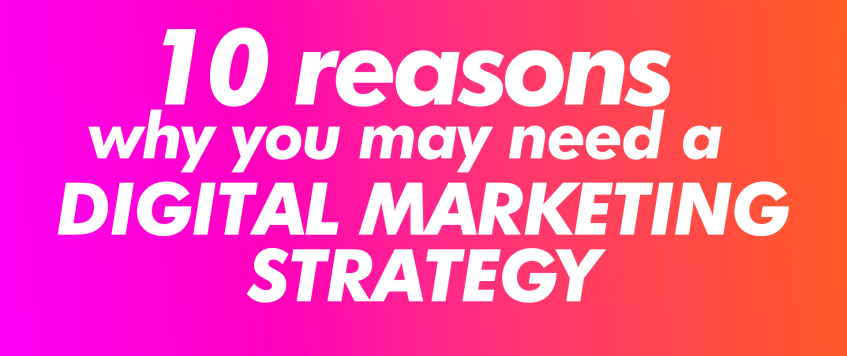-
22
Feb
10 reasons why you may need a digital marketing strategy
It’s important to be able to make the business case to invest more in digital marketing since, if you can’t convince yourself or your colleagues to invest, then the future of your business is in jeopardy. It’s simple, you won’t be able to compete to attract new customers in the future.
So, if you don’t yet have a strategy, or maybe you want to review which business issues are important to include within a strategic review, we’ve set out the 10 most common problems that in our experience arise if you don’t have a strategy.
1. You’re directionless
I find that companies without a digital strategy (and many that do) don’t have a clear strategic goal for what they want to achieve online in terms of gaining new customers or building deeper relationships with existing ones. And if you don’t have goals with smart digital marketing objectives you likely don’t put enough resources to reach the goals and you don’t evaluate through analytics whether you’re achieving those goals. Our templates can support you to create more realistic forecasts of investing in digital media and improving conversion rates.
2. You won’t know your online audience or market share
Customer demand for online services may be underestimated if you haven’t researched this. Perhaps, more importantly, you won’t understand your online marketplace. The dynamics will be different from traditional channels with different types of customer profile and behaviour, competitors, propositions, and options for marketing communications.
Our templates include a customer persona guide and template to help you develop more detailed, realistic personas that map messages and content requirements through the customer journey.
3. Existing and start-up competitors will gain market share through optimizing their always-on marketing
If you’re not devoting enough resources to digital, or you’re using an ad-hoc approach with no clearly defined strategies, then your competitors will eat your digital lunch!
Always-on marketing refers to the investments in paid, owned and earned media needed across the customer lifecycle. These are needed to maintain visibility and support conversion and retention continuously as people search for and select products online.
4. You don’t have a powerful online value proposition
As part of defining the scope of opportunity when using a strategic approach to digital marketing, it’s helpful to think about how digital experiences can improve your brand appeal. This involves improving online services, interactive tools and digital audience interactions to improve customer service.
A clearly defined digital value proposition tailored to your different target customer personas will help you differentiate your online service encouraging existing and new customers to engage initially and stay loyal.
5. You don’t know your online customers well enough
It’s often said that digital is the “most measurable medium ever”. But Google Analytics and similar will only tell you volumes of visits, not the sentiment of visitors, what they think. You need to use other forms of research and website user feedback tools to identify your weak points and then address them.
6. You’re not integrated (“disintegrated”)
It’s all too common for digital activities to be completed in silos whether that’s a specialist digital marketer, sitting in IT, or a separate digital agency. It’s easier that way to package ‘digital’ into a convenient chunk. But of course, it’s less effective. Everyone agrees that digital media work best when integrated with traditional media and response channels.
That’s why we recommend developing an integrated digital marketing strategy, so your digital marketing works hard for you! With your integrated plan in place, digital will become part of your marketing activity and part of business as usual.
7. Digital doesn’t have enough people/budget given its importance
Insufficient resources will be devoted to both planning and executing e-marketing. There is likely to be a lack of specific specialist e-marketing skills which will make it difficult to respond to competitive threats effectively.
You’ll have access to strategy and planning tools including performance and digital maturity benchmarking, and regular marketing data reports, so you can keep track of your position in a competitive landscape.
8. You’re wasting money and time through duplication
Even if you do have sufficient resources, they may be wasted. This is particularly the case in larger companies where you see different parts of the marketing organization purchasing different tools or using different agencies for performing similar online marketing tasks.
That’s why you need to invest in a marketing strategy that works for you and your team, to plan, manage and optimize your digital channels and platforms. Drive the marketing results you need to achieve your business objectives, and boost your marketing ROI.
9. You’re not agile enough to catch up or stay ahead
If you look at the top online brands like Amazon, Booking.com, Dell, Google and Zappos, they’re all dynamic – trialing new approaches to gain or keep their online audiences.
10. You’re not optimizing
Every company with a website will have analytics. But many senior managers don’t ensure that their teams make or have the time to review and act on them. Once your digital channel strategy enables you to get the basics right, then you can progress to the continuous improvement of the key aspects like brand building, site user experience, and lead nurturing.
Relevant Articles : Digital Marketing Expert, Digital Surpasses, Marketing Objectives, Steps For Effective Online Marketing
